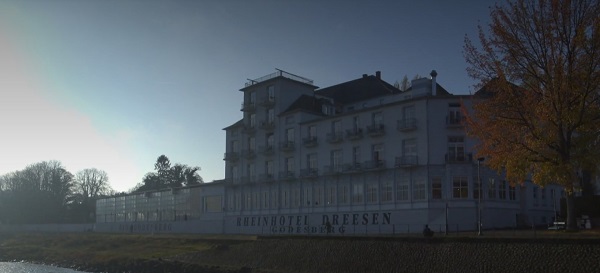
Rheinhotel Dreesen - The white House on the Rhine
Documentary
Synopsis
Extract from WDR
In its 130-year history, the "Rheinhotel Dreesen" has been an excursion pub, a noble hostel, a dance hall, the Führer's favorite Hotel, a place of negotiation for world peace, a concentration camp outpost, a refugee shelter, and the seat of the French High Commissioner. The Hotel at the Rhine and its people are on a first-name basis with German history - from the time of the Kaiser to the Bonn Republic. Following the chronology of events, the documentary tells the story of the hotel and its connection to historical turning points.
From a small excursion pub with a view of the Rhine, owner Fritz Dreesen I made the Hotel one of the first grand hotels in Germany. Since its opening in 1894, it has been a mirror of German history: travel emperor Wilhelm II is said to have enjoyed residing at the Dreesen during his numerous visits to his old university town and conducting marching bands in the Chestnut Garden, which still exists today. Paul von Hindenburg was a guest here, as were Gustav Stresemann, Greta Garbo, Hans Albers, Charlie Chaplin - and Adolf Hitler. The dictator, was so enthralled by the view of the Rhine, Drachenfels and the Siebengebirge that he later had an entire suite reserved exclusively for himself on a permanent basis - bill to the Reich Chancellery.
The infamous meeting between Chamberlain and Hitler during the Sudeten crisis in 1938 also made the Dreesen internationally known as "Hitler's favorite hotel". Whoever stayed at the Rheinhotel, owner Fritz Dreesen entertained all his guests with the same attitude of the perfect host. His wife Maria was friends with Eva Braun, and accompanied her on trips. Together they belonged to the inner circle around Adolf Hitler. During World War II, the Rheinhotel temporarily became a branch of the Buchenwald concentration camp: "Special prisoners of the Führer" were housed here, including Charles de Gaulle's sister. The prominence of the high-ranking prisoners is said to have saved Bad Godesberg from the Allied bombing raids - a thoroughly intended effect, legend has it: The mayor of Godesberg at the time and Fritz Dreesen are said to have jointly devised the human shield.
When the Americans finally arrived in the spring of 1945, General Dwight D. Eisenhower took up residence at the Dreesen - which was not good for the house wine stocks. Until the "Rheinhotel Dreesen" was finally able to resume operations in 1952, it was first turned into a refugee camp, then into the headquarters of the French High Commissioner. With the election of Bonn as the federal capital, the Dreesen also remained in the focus of German history: Adenauer negotiated the response to the Stalin Note here, and time and again the Rheinhotel became the backdrop for international congresses until its political significance faded away at the end of the Bonn Republic. Today, therefore, the "Rheinhotel Dreesen" has to make even more of an effort to attract guests than in the past, because since the government moved to Berlin, business and congress guests have largely stayed away. But Anna-Maria Dreesen, who is soon to take over the hotel, already has concrete plans...
The documentary "Rheinhotel Dreesen - The white House on the Rhine" is a production by Zeitsprung Pictures commissioned by the WDR.

